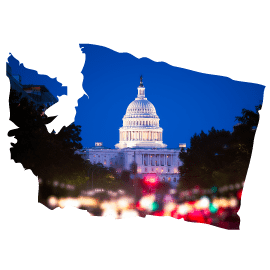Elementary Teacher Preparation in
Mathematics: Washington
Delivering Well Prepared Teachers Policy
Analysis of Washington's policies
Washington relies on its standards for teacher preparation programs as the basis for articulating its requirements for the mathematics content knowledge of elementary teacher candidates.
The state does not specify any coursework requirements regarding mathematics content. However, Washington has articulated teaching standards that its approved teacher preparation programs must use to frame instruction in elementary mathematics content. The state's standards appropriately address content in mathematics foundations, but although they mention such areas as algebra, geometry and statistics, the standards lack the specificity needed to ensure that teacher preparation programs deliver this mathematics content of appropriate breadth and depth to elementary teacher candidates.
Finally, Washington requires that all new elementary teachers pass the Washington Educator Skills Test — Endorsement (WEST-E). Although the state subject-examination test requires passing scores on both subtests that comprise the overall test, the test combines the subtest for mathematics, science and physical education, so it may be possible to answer many mathematics questions incorrectly and still pass the test.
Recommendations for Washington
Require teacher preparation programs to provide mathematics content specifically geared to the needs of elementary teachers.
Although Washington requires knowledge in some key areas of mathematics, the state should require teacher preparation programs to provide mathematics content specifically geared to the needs of elementary teachers. This includes specific coursework in foundations, algebra and geometry, with some statistics.
Require teacher candidates to pass a rigorous mathematics assessment.
Washington should ensure that its math assessment evaluates candidates' knowledge beyond an elementary school level, challenges their understanding of underlying concepts and requires candidates to apply knowledge in nonroutine, multistep procedures. The state should also require a passing score specifically in math for its content assessments to ensure that teacher candidates have adequate mathematics knowledge. Such a score could be used to allow candidates to test out of coursework requirements. Teacher candidates who lack minimum mathematics knowledge should not be eligible for licensure.
State response to our analysis
Washington recognized the factual accuracy of this analysis. The state added that the elementary education Teacher Performance Assessment (TPA) will focus on specific subject areas, and it is likely the Board will require that a certain percentage of randomly selected candidates have a separate score on the math portion of the TPA, thus allowing for specific analysis of candidate and program effectiveness related to elementary math instruction.
Last word
While it is clear that looking at the specific scores of a percentage of randomly selected candidates can be useful for program accountability, it does nothing to ensure that the state is not licensing individuals who are not prepared to teach mathematics to their elementary students.
Select another topic
Delivering Well Prepared Teachers
- Admission into Preparation Programs
- Elementary Teacher Preparation
- Elementary Teacher Preparation in Reading Instruction
- Elementary Teacher Preparation in Mathematics
- Middle School Teacher Preparation
- Secondary Teacher Preparation
- Secondary Teacher Preparation in Science
- Secondary Teacher Preparation in Social Studies
- Special Education Teacher Preparation
- Assessing Professional Knowledge
- Student Teaching
- Teacher Preparation Program Accountability
Expanding the Pool of Teachers
Identifying Effective Teachers
- State Data Systems
- Evaluation of Effectiveness
- Frequency of Evaluations
- Tenure
- Licensure Advancement
- Equitable Distribution

